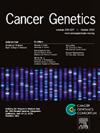35.脑膜瘤的综合全面基因组图谱分析:单一机构研究
IF 1.4
4区 医学
Q4 GENETICS & HEREDITY
引用次数: 0
摘要
脑膜瘤是最常见的中枢神经系统肿瘤,因其良性而研究不足。高级别脑膜瘤通常预后较差,富含高风险的拷贝数异常(CNAs),包括染色体1p、3p、4p/q、6p/q、10p/q、14q、18p/q和19p/q的缺失/片段缺失、CDKN2A/B同源染色体缺失(CDKN2A/B-homo)和TERT启动子突变(TERTp)是通过包括SNP微阵列、新一代测序(NGS)和DNA甲基化在内的全面基因组分析(CGP)检测到的。在这项研究中,我们对大量脑膜瘤病例进行了CGP分析。在评估的270个病例中,我们发现了122个(45.2%)病例具有高风险CNA,其中包括33个WHO-I级病例、67个WHO-II级病例和22个WHO-III级病例。51例(41.8%)为低二倍体,其特征为22、14、10、X/Y、6和8的丢失;18例(14.8%)为多倍体,其特征为1p、14、18、6和10的相对丢失。在 53 例(43.4%)近二倍体病例中,半数显示出复杂的 CNA,涉及 1p、3p、19p、14q 和 6q 的缺失/片段缺失。5个病例(4.1%)表现为CDKN2A/B-homo。在 30 个病例中进行的 NGS 发现了 NF2(n=20)、ARID1A(n=7)和 MSH6(n=4)的突变。7例(6.6%,7/106)有TERTp突变。在所检测的病例中,92%(79/86)的甲基化图谱与脑膜瘤分类器相匹配。CGP分别将58%的WHO-Ⅰ级和67.2%的WHO-Ⅱ级肿瘤升级为WHO-Ⅱ级和Ⅲ级。虽然随访数据有限,但有51名患者(41.8%)肿瘤复发。我们的研究表明,即使在低分级肿瘤中,脑膜瘤也富含高风险的CNAs,而TERTp突变或CDKN2A/B-homo的发生率较低。CGP对肿瘤的分子特征描述具有重要的临床意义。CGP应在临床上加以利用,并纳入未来的WHO肿瘤分级和风险分层分类中。本文章由计算机程序翻译,如有差异,请以英文原文为准。
35. Integrated comprehensive genomic profiling of meningiomas: A single institutional study
Meningioma is the most common central nervous system tumor and understudied because of its benign nature. High-grade meningiomas often show poorer outcome and enriched with high-risk copy-number-aberrations (CNAs) including losses/segmental-losses of chromosomes 1p, 3p, 4p/q, 6p/q, 10p/q, 14q, 18p/q and 19p/q, CDKN2A/B homozygous-deletion (CDKN2A/B-homo) and TERT promoter-mutation (TERTp) detected by comprehensive genomic profiling (CGP) including SNP-microarray, next generation sequencing (NGS) and DNA-methylation. In this study, we performed CGP on a large series of meningioma.
We identified 122 (45.2%) cases with high-risk CNAs in 270 cases assessed, including 33 WHO-grade-I, 67 WHO-grade-II and 22 WHO-grade-III. Fifty-one (41.8%) cases had hypodiploidy characterized by losses of 22, 14, 10, X/Y, 6 and 8; Eighteen (14.8%) showed polyploidy with relative losses of 1p, 14, 18, 6 and 10. In 53 (43.4%) cases with near-diploidy, half showed complex CNAs with losses/segmental-losses involving 1p, 3p, 19p,14q and 6q. Five cases (4.1%) showed CDKN2A/B-homo. NGS performed in 30 cases revealed mutations in NF2 (n=20), ARID1A (n=7), MSH6 (n=4). Seven (6.6%, 7/106) had TERTp mutation. Methylation profiling matched classifier for meningioma in 92% (79/86) of cases tested. CGP upgraded 58% WHO-grade-I and 67.2% WHO-grade-II tumors to WHO-grade-II and III, respectively. Although follow-up data is limited, 51 patients (41.8%) had tumor recurrence.
Our study showed that meningiomas are enriched by high-risk CNAs even in low-grade tumors, less frequent TERTp mutation or CDKN2A/B-homo. CGP is of clinical importance for tumor molecular characterizations. CGP should be utilized clinically and integrated in future WHO classifications for tumor grading and risk stratification.
求助全文
通过发布文献求助,成功后即可免费获取论文全文。
去求助
来源期刊

Cancer Genetics
ONCOLOGY-GENETICS & HEREDITY
CiteScore
3.20
自引率
5.30%
发文量
167
审稿时长
27 days
期刊介绍:
The aim of Cancer Genetics is to publish high quality scientific papers on the cellular, genetic and molecular aspects of cancer, including cancer predisposition and clinical diagnostic applications. Specific areas of interest include descriptions of new chromosomal, molecular or epigenetic alterations in benign and malignant diseases; novel laboratory approaches for identification and characterization of chromosomal rearrangements or genomic alterations in cancer cells; correlation of genetic changes with pathology and clinical presentation; and the molecular genetics of cancer predisposition. To reach a basic science and clinical multidisciplinary audience, we welcome original full-length articles, reviews, meeting summaries, brief reports, and letters to the editor.
 求助内容:
求助内容: 应助结果提醒方式:
应助结果提醒方式:


